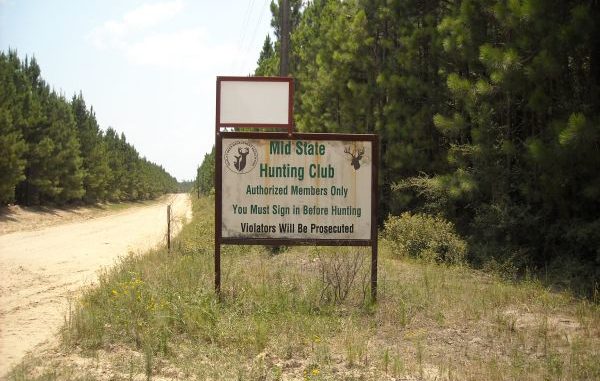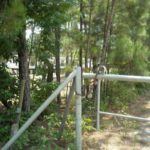
Last month we talked about the all-too-common problems of trespass and poaching on private land. In this edition we will take a more in-depth look at these offenses and what to do about them.
During my years as a wildlife enforcement agent, I saw some aspects of trespassing evolve with the times, particularly where leasing was concerned.
In the 1970s and ’80s, timber company lands previously open to public hunting were leased as the companies began to recognize the potential for additional income from hunting. Rising deer numbers and better understanding of how to manage whitetails made leasing a more-attractive proposition to hunters. Those same hunters were also experiencing better-quality hunting experiences on limited-access private land.
As timberland was leased, many hunters would arrive at a favored hunting spot a day or two before the deer season opener, only to find the land now leased and posted. That did not sit well with many of them, and some would go ahead and set up camp anyway and take the risk of hunting the property, or refuse to leave when asked to do so by the lease-holder.
This would, of course, generate calls to law enforcement for help in handling a tense situation. In most cases a visit to the campsite to verify the land was no longer open to public hunting and an invitation to leave was all that was needed. That was best done before dark and before the alcohol started flowing.
As time went on and public access to private land became a thing of the past, those situations passed with it. But trespass has certainly not gone away and, if anything, has gotten worse due to the fact that virtually no private land is open to public hunting.
So who is most vulnerable and as a result most likely to have unwanted visitors helping out with wildlife harvest?
I have friends who own land accessible by boat from the Mississippi and Red rivers. They will tell you, correctly so, they have had problems. Land accessible by boat from public waters is very vulnerable to trespass. It is much more difficult to monitor traffic on a river or bayou than along roads.
If a road runs through the property, we have two ways in and out by vehicle. If the same property is bordered by a river or stream, it may be entered from anywhere the water touches the land. That can mean a lot of riverbank to check for signs of entry or to put under surveillance.
Also vulnerable is land bordering residential property in rural areas. Most of the time, people living just across the property line from the hunting lease are the very ones who hunted the property before it was leased up. Some have no inclination to stop hunting “behind the house” just because someone leased it, and they can be tough to stop.
I once spotted a guy in the last minutes of legal shooting hours holding a .270 rifle and leaning against a gatepost. He was staring down the private road on leased timber-company land on the other side of the gate, apparently hoping for a deer to step out in the road.
His side of the gate was his back yard, and his mobile home was no more than 15 yards away. He had hunting licenses, and there is not much you can do to a guy for standing in his yard holding his legal rifle, except to tell him that if he did shoot anything on the adjoining property and got caught, he could be prosecuted. I notified those lease members of what was going on and was glad it was not my lease.
How do you know or find out if someone is trespassing? First of all, get out on the property and look around. Has someone been driving around the gate or cut the fence? Have “Posted” or “No Hunting” signs been torn down or destroyed? Are you seeing foot, vehicle or horse tracks no one can explain? Are you finding empty beer cans and other litter along roads and trails? In general, pay close attention to details, and if you find signs of activity not consistent with lease-member activity, something might be up.
Communicate on a regular basis with other lease members. I am a member of a hunting lease requiring by rule that all hunts begin and end by checking in and out at the camp house. When we gather after morning and evening hunts, we talk about things like shots fired, ATV noise, or anything else heard or seen that cannot be accounted for by members. On more than one occasion those discussions have helped us confirm trespass activity.
Also make an effort to get to know people in the community around your hunting ground. Word gets around in small communities, and folks will pass along information about all sorts of activities if we simply talk with them and ask. That is an old and effective law enforcement practice, and before anyone ever heard of community policing game wardens and sheriff’s deputies were keeping up with current activities by simply visiting with people in rural and remote areas.
Get acquainted with the wildlife agent and sheriff’s deputies who work the area around your property, particularly the wildlife agent. This is no criticism of sheriff’s deputies — many of them are quite capable in the woods and on the water. But wildlife agents are trained and equipped to get off the road and in the woods, while deputies confine most patrol activity to public roads and populated areas, and focus on a different area of law enforcement.
If you don’t know the wildlife agent working your area, contact the nearest LDWF regional office and speak with the region’s captain. Give him your name and phone number, and ask to have the agent for your area give you a call.
Get acquainted before you have a problem. Let the agent know your intention to report any and all wildlife violations, and that you would appreciate his help in keeping an eye on your property. Chances are he will provide his personal cell phone number and will respond quickly when needed.
Should a trespasser be confronted on your property, handle the situation with caution. A poacher will be armed and, unless you know the person, you have no idea how he will react. Identify yourself, and ask his name and other pertinent information like address and how he got onto the property. Be firm in telling him he is on private property and he cannot hunt here.
Don’t make threats or tell him he will be arrested for the offense, and unless you are a law enforcement officer with the power to arrest, don’t attempt to physically hold or restrain someone until law enforcement arrives.
The decision to press charges or let it go with a warning can be made after the confrontation and with the assistance of law enforcement. Get a good description of the person and any vehicle license number or boat registration number, if possible.
Reactions to getting caught poaching range from breaking down in tears to exploding in a gun brandishing fit of rage and everything in between. Don’t push a potentially dangerous situation.




